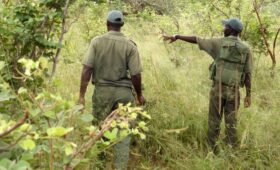The month of March is known to be the month that we celebrate and cherish women for the invaluable role they play in making our societies a better place. They are the fabric that underpins a successful and healthy society.
As we have celebrated the month of women, which coincides with the month that we celebrate the International Wildlife Day and Africa Environment Day, it is imperative to reflect on the significant role that women play in the conservation and sustainable utilization of nature.
The importance of women in supporting the protection, conservation, and restoration of wildlife and nature can never be over-emphasized. Around the world, almost 50% of the population is made up of women, and therefore any nature conservation initiatives that exclude women will fall short of potential effectiveness.
The knowledge, experience, and role of women in managing, using, and conserving nature are unique from that of men. It is that uniqueness that makes a positive difference. A study by the International Union for Conservation of Nature (IUCN) has shown that women are more effective in devising and implementing solutions that promote livelihoods while managing conflict with nature. It has also been found that women are more likely than men to adopt climate-smart techniques, and that involvement of women in group decision making on land management yields relatively more conservation outcomes than group decision making that excludes women.
Every day women make multiple choices that have a bearing on the environment. In Africa, most women make decisions on gathering food, water, and fuelwood. Thus, women interface relatively more with the environment in Africa than their male counterparts do. As a result, they are also disproportionately affected by adverse climate change impacts that arise from environmental degradation. It is therefore important that women play a more critical role in decision-making affecting nature and the environment.
It is important to reaffirm the role of women in safeguarding the intrinsic value of wildlife and its various contributions including ecological, genetic, social, economic, scientific, educational, cultural, recreational, and aesthetic to sustainable development and human well-being.
Development is largely dependent on nature, with more than 50% of the world’s gross domestic product dependent on nature. This makes nature an indispensable resource for social and economic prosperity. However, the human quest for development is exerting enormous pressure on scarce natural heritage, with adverse consequences manifesting in extreme weather conditions, land degradation, and biodiversity loss, which affect women relatively more than men because of the traditional role in gathering food, water, and fuelwood.
On the other hand, despite the rich endowments of nature in developing countries, harnessing such nature for transformative development remains elusive, leading to high levels of poverty, which disproportionately affect women.
It is imperative, therefore, that the quest for development is balanced within planetary limits, to sustain benefits across multi-generations and that nature be effectively harnessed to build diversified and resilient livelihoods. But more importantly, women should be involved in solution making to address unsustainable activities.
At African Wildlife Foundation we have developed a Zimbabwe Country Conservation Strategy (2020-2030) which spells out a guiding framework for AWF Zimbabwe’s work towards promoting sustainable development underpinned by sound management and utilization of wildlife and wildland assets. Our strategy recognizes the important role that women and other marginalized groups play in achieving our vision of an Africa where wildlife and wildlands are recognized as an asset for attaining sustainable development.
Our approach to wildlife and wildlands conservation is people-centric and therefore recognizes conservation, not as an end in itself, but as a medium for attaining sustainable livelihoods and improved standards of living for current and future generations, with special emphasis on women and marginalized groups that bear the most burden of environmental degradation.
As we continue to celebrate women, I would like to urge the government, private sector, civil society organizations, and other stakeholders to work collectively in raising the status of women in conservation. Without their contribution, the conservation sector will never reach its potential in safeguarding nature and its vital services that are so much important for human sustenance.




